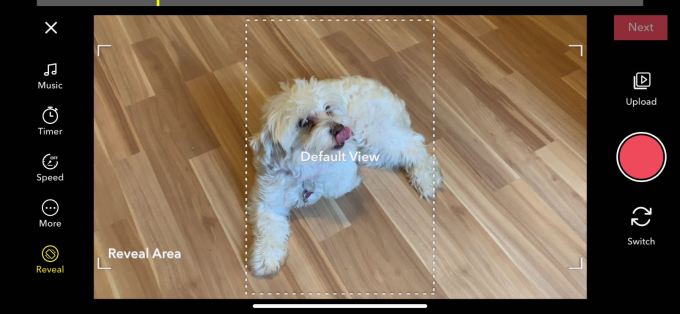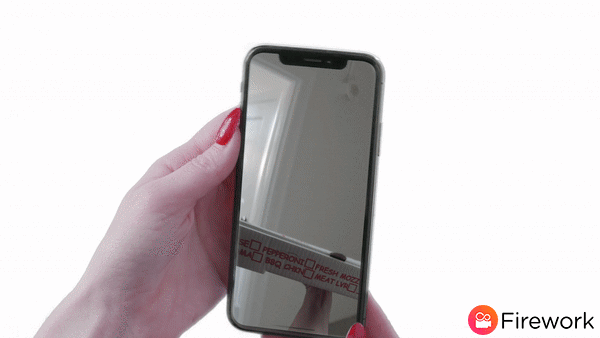Firework officially launches a short-form video storytelling app, backed by Lightspeed
Facebook usage has declined for the first time in a decade, while video-centric apps like TikTok are being touted as the future of social media. Entering this redefined playing field comes Firework, a fast-growing social video app whose clever trick is something it calls “reveal videos” — a way for creators to take both horizontal and vertical video in one shot from their mobile device. Video viewers can then twist their phone as the video plays to watch from a new perspective and see more of the scene.
While Snapchat pioneered the idea of vertical video, newer companies are trying to free viewers from format constraints.
For example, Jeffrey Katzenberg’s mobile streaming service Quibi is pitching its ability to offer an ideal viewing experience no matter how you hold your phone. As Quibi CEO Meg Whitman explained last week in an interview at SXSW, the company has “created the ability to do full-screen video seamlessly from landscape to portrait,” she said.
That sounds a lot like Firework, in fact.
Firework has filed a patent on its own flip-the-screen viewing technology, which it believes will give creators new ways to tell stories. Besides letting viewers in on more of the action, “reveal videos” also provide an opportunity for things like unexpected plot twists or surprise endings.
The way this works is that creators hold their smartphone horizontally to film, and Firework places a vertical viewfinder on the screen so they know which part of their shot will appear to viewers when they hold their phone straight up and down.
This recording screen has some similarities to TikTok, as you can stop and start recording, reshoot the various parts and add music.

“Snapchat really pushed being vertical only,” explains Firework Chief Revenue Officer Cory Grenier, who joined the company from Snapchat, where he was the first director of Sales & Marketing.
“What we see is that most professional filmmakers want to show their work on Vimeo first, and second on YouTube. There isn’t this world where you can really frame the context and the characters of a cinematic story on vertical — it just can’t happen,” he says.
Beyond the technology involved with Firework’s new filming technique, the company is also aiming to carve out a space that will differentiate it from other short-form video — whether that’s TikTok or, soon, Quibi.
Firework’s videos are longer than TikTok’s at 30 seconds instead of just 15, but far shorter than Quibi’s eight minutes.
“Thirty seconds is really the sweet spot between the Snaps that are 10 seconds and something that’s longer-form,” notes Grenier. “Ten seconds is too short to really tell a story. You want to have a powerful opening, a clear middle and a really interesting or unexpected ending,” he says.
This format lends itself better to short stories, rather than the remixed, music-backed memes found on TikTok, the company believes. But it also remains user-gen, as opposed to the high production value “TV quality” content shot for Quibi using two cameras. (And a lot more money).
Instead, Firework is focused on what it calls “premium user-gen” — meaning it will feature a mix of professional creators and up-and-comers. To date, Firework has worked with names like Flo Rida, Dexter Darden (“Maze Runner”), model and Miss USA Olivia Jordan, Disney star Jordyn Jones, Frankie Grande and others.
It’s also working with a handful of brands, including Refinery29 and Complex Networks. But the company doesn’t want to inundate the app with content from brands, it says.
In addition to the horizontal-to-vertical trick, Firework is also doing something different in terms of fan engagement: it’s ditching comments. Users can only privately message a video’s creator — they can’t comment on the video itself.
“Haters and trolls, they want an audience — they want to elicit a polarizing reaction. We remove that,” says Grenier.
And instead of “liking” a video, users can only bookmark the video or share it — an engagement that is styled like a retweet, as the video is posted to your profile with all the original credit intact.
Founded less than two years in Mountain View and now relocated to Redwood City with teams in LA, Japan and Brazil, Firework parent Loop Now tested a couple of apps that didn’t find product market fit before launching Firework.

Its team of 51 full-time today combines both tech talent and Hollywood expertise.
This includes: CEO Vincent Yang, a Stanford MBA and previously co-founder and CEO at EverString; co-founder and COO Jerry Luk, employee No. 30 at LinkedIn and previously at Edmodo; biz dev head Bryan Barber, formerly of Warner Brothers, Universal Pictures and Fox; and CRO Corey Grenier, noted above.
Unlike Quibi, Firework’s parent company Loop Now Technologies has raised “millions” — not a billion dollars — to get off the ground. Its early backers include original Snap investor Lightspeed, IDG Capital and an (undisclosed) early investor in Musical.ly. (Firework is poised to announce its Series A in a few weeks, so is holding off on investment details for now.)
The app launched last year and has been in an open beta until now.
According to data from Sensor Tower, it has 1.8 million installs on iOS, 55 percent in the U.S.
Firework claims it has 2 million registered users across iOS and Android.
Contributer : Social – TechCrunch
 Reviewed by mimisabreena
on
Friday, March 15, 2019
Rating:
Reviewed by mimisabreena
on
Friday, March 15, 2019
Rating:















No comments:
Post a Comment